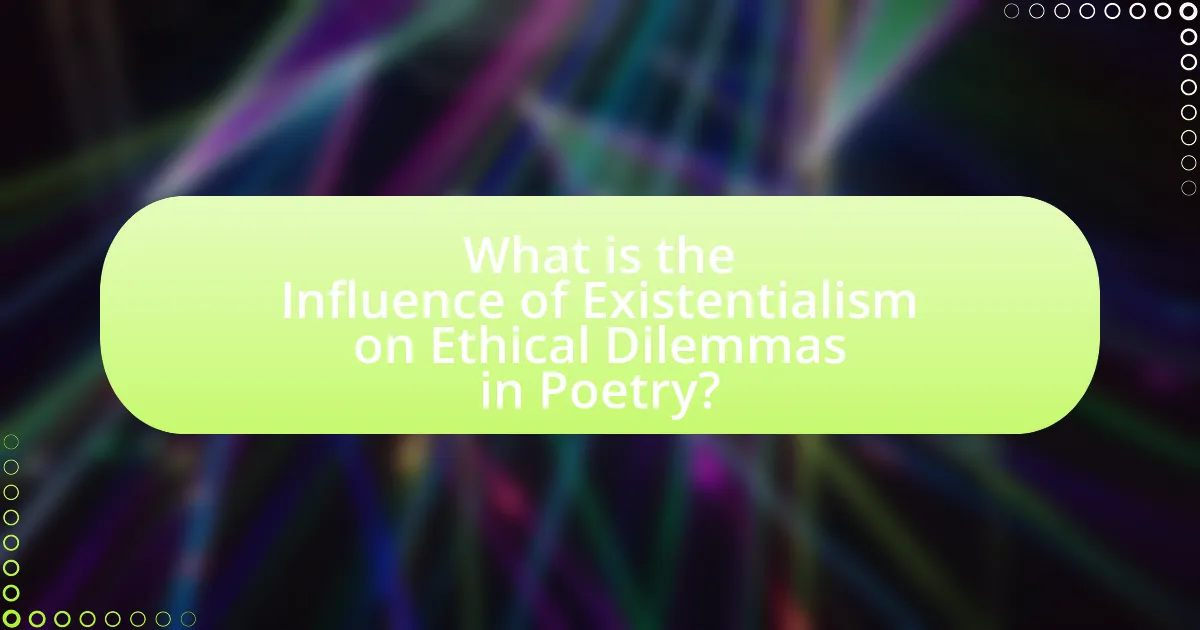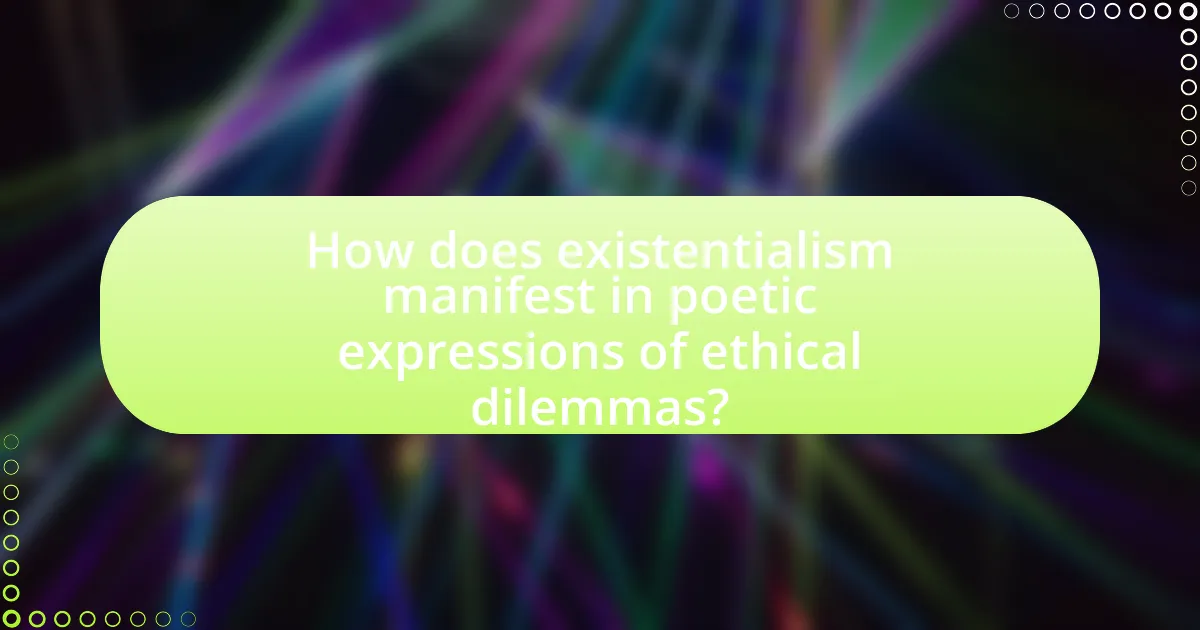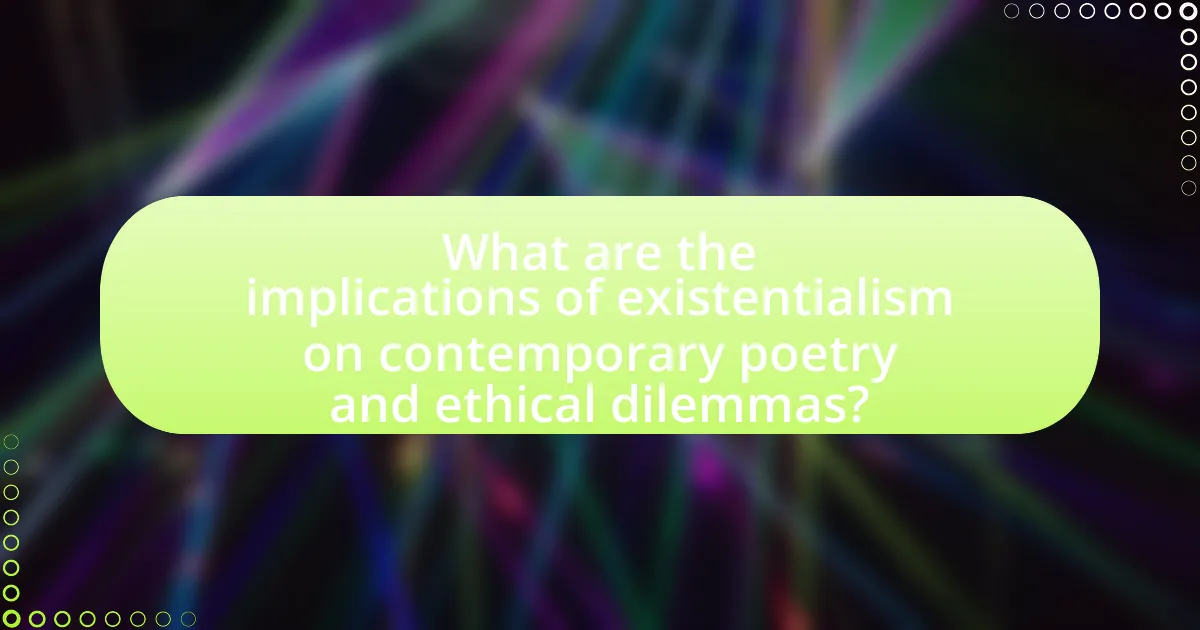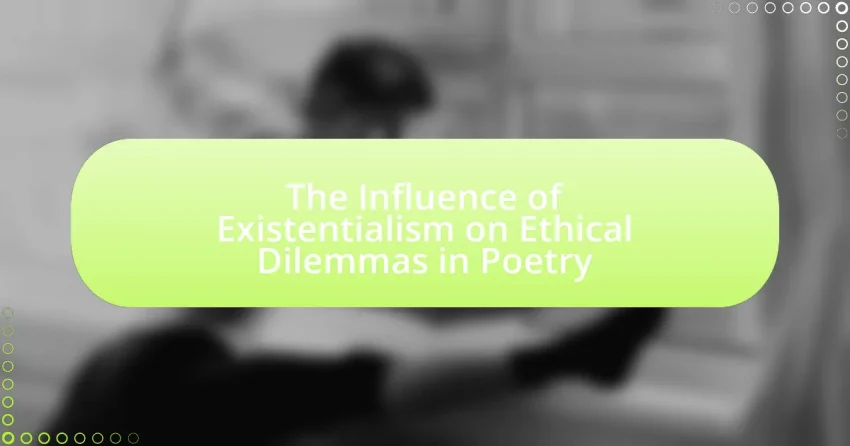The article examines the influence of existentialism on ethical dilemmas in poetry, highlighting how this philosophical movement shapes individual choice and moral responsibility in a world perceived as lacking inherent meaning. It discusses key tenets of existentialism, such as freedom and absurdity, and their manifestation in the works of poets like T.S. Eliot and Sylvia Plath. The article further explores how poets convey the complexities of ethical choices through various stylistic approaches and poetic forms, while also addressing contemporary ethical dilemmas that resonate with existentialist thought. Overall, it underscores the significance of ethical dilemmas in understanding human existence and the role of poetry in reflecting these moral complexities.

What is the Influence of Existentialism on Ethical Dilemmas in Poetry?
Existentialism significantly influences ethical dilemmas in poetry by emphasizing individual choice and the inherent absurdity of life. This philosophical movement, rooted in the works of thinkers like Jean-Paul Sartre and Albert Camus, posits that individuals must navigate their own moral landscapes in a world devoid of inherent meaning. Poets often reflect this struggle through themes of alienation, freedom, and the search for authenticity, illustrating how characters confront ethical choices in the face of existential uncertainty. For instance, the poetry of T.S. Eliot and Sylvia Plath encapsulates the tension between societal expectations and personal truth, showcasing the complexities of moral decision-making in an absurd world. This connection between existentialism and ethical dilemmas in poetry highlights the profound impact of existential thought on literary expression and moral inquiry.
How does existentialism shape ethical perspectives in poetry?
Existentialism shapes ethical perspectives in poetry by emphasizing individual freedom, choice, and the inherent meaninglessness of life, which compels poets to explore moral ambiguity and personal responsibility. This philosophical framework encourages poets to confront existential dilemmas, often reflecting on the subjective nature of ethics and the struggle for authenticity in a seemingly indifferent universe. For instance, poets like Jean-Paul Sartre and Samuel Beckett illustrate how characters grapple with moral decisions in the absence of absolute truths, highlighting the tension between personal values and societal norms. This exploration of ethical perspectives is evident in works that question traditional moral frameworks, thereby inviting readers to engage with the complexities of human existence and the choices that define it.
What are the key tenets of existentialism that impact ethical dilemmas?
The key tenets of existentialism that impact ethical dilemmas include individual freedom, responsibility, and the inherent meaninglessness of life. Individual freedom emphasizes that individuals must make their own choices, which directly influences ethical decision-making as it places the burden of responsibility on the individual. This notion is supported by Jean-Paul Sartre’s assertion that “existence precedes essence,” meaning that individuals create their own values and ethics through their actions. Additionally, the idea of absurdity, as articulated by Albert Camus, suggests that life lacks inherent meaning, prompting individuals to confront ethical dilemmas without predefined moral frameworks. This existential perspective compels individuals to navigate ethical challenges based on personal conviction rather than societal norms, leading to a more subjective approach to morality.
How do poets interpret existentialist themes in their work?
Poets interpret existentialist themes in their work by exploring concepts such as absurdity, freedom, and the search for meaning in a seemingly indifferent universe. For instance, poets like T.S. Eliot and Samuel Beckett delve into the human condition, illustrating the struggle against existential despair and the quest for identity. Their use of fragmented narratives and disjointed imagery reflects the chaotic nature of existence, emphasizing the individual’s isolation and the inherent lack of predetermined purpose. This approach aligns with existentialist philosophy, particularly the ideas of thinkers like Jean-Paul Sartre and Albert Camus, who argue that individuals must create their own meaning in a world devoid of inherent significance.
Why are ethical dilemmas significant in poetry influenced by existentialism?
Ethical dilemmas are significant in poetry influenced by existentialism because they reflect the core existential themes of choice, freedom, and the search for meaning in an indifferent universe. Existentialist poets, such as Jean-Paul Sartre and Samuel Beckett, often explore the tension between individual agency and moral responsibility, illustrating how characters confront choices that define their existence. This exploration is crucial as it highlights the struggle of individuals to navigate complex moral landscapes, emphasizing that ethical decisions are often fraught with ambiguity and uncertainty. The significance is further underscored by the way these dilemmas resonate with readers, prompting them to reflect on their own moral choices and the inherent challenges of existence.
What role do ethical dilemmas play in the exploration of human existence?
Ethical dilemmas are central to the exploration of human existence as they challenge individuals to confront moral choices that define their values and beliefs. These dilemmas often reveal the complexities of human nature, illustrating the conflict between personal desires and societal expectations. For instance, existentialist philosophers like Jean-Paul Sartre emphasized that individuals must navigate these moral quandaries to assert their freedom and authenticity, thereby shaping their identity. This interplay between ethical decision-making and self-discovery is crucial in understanding the human condition, as it highlights the struggle for meaning in a world filled with ambiguity and uncertainty.
How do poets convey the complexity of ethical choices through existentialist lenses?
Poets convey the complexity of ethical choices through existentialist lenses by exploring themes of individual freedom, responsibility, and the inherent absurdity of life. Existentialist poets, such as Jean-Paul Sartre and Samuel Beckett, illustrate how characters grapple with moral dilemmas in a world devoid of absolute values, emphasizing the subjective nature of ethical decision-making. For instance, Sartre’s poetry often reflects the tension between personal choice and societal expectations, showcasing how individuals must navigate their own moral paths despite external pressures. This approach highlights the struggle for authenticity and the weight of consequences that accompany each choice, reinforcing the idea that ethical decisions are deeply personal and fraught with ambiguity.

How does existentialism manifest in poetic expressions of ethical dilemmas?
Existentialism manifests in poetic expressions of ethical dilemmas through the exploration of individual choice, freedom, and the inherent absurdity of life. Poets such as Jean-Paul Sartre and Samuel Beckett illustrate how characters confront moral decisions in a world devoid of absolute values, emphasizing the weight of personal responsibility. For instance, Sartre’s poetry often reflects the struggle of individuals to define their essence through actions, highlighting the tension between societal expectations and personal authenticity. This is evident in works like “Nausea,” where the protagonist grapples with existential angst and ethical choices, illustrating the conflict between self-determination and external pressures. Such poetic expressions serve to illuminate the complexities of ethical dilemmas, reinforcing the existential belief that individuals must navigate their moral landscapes without predetermined guidelines.
What are some notable examples of poets addressing ethical dilemmas through existentialism?
Notable examples of poets addressing ethical dilemmas through existentialism include T.S. Eliot, whose poem “The Love Song of J. Alfred Prufrock” explores the paralysis of choice and the fear of judgment, reflecting existential concerns about identity and morality. Similarly, Sylvia Plath’s “Daddy” confronts complex themes of authority and personal trauma, illustrating the struggle between individual ethics and societal expectations. Additionally, Rainer Maria Rilke’s “The Duino Elegies” delves into the tension between existence and the search for meaning, highlighting ethical questions about love, death, and the human condition. These poets effectively use existential themes to grapple with moral complexities, making their works significant in the discourse on ethics in poetry.
How do specific poems illustrate the conflict between freedom and responsibility?
Specific poems illustrate the conflict between freedom and responsibility by depicting characters who grapple with the consequences of their choices. For example, in “The Road Not Taken” by Robert Frost, the speaker faces a pivotal decision that symbolizes the tension between the desire for personal freedom and the weight of responsibility that comes with making a choice. The poem emphasizes that each path represents not only a different direction in life but also the responsibilities that accompany those choices, highlighting the existential dilemma of freedom versus obligation. Similarly, in “The Love Song of J. Alfred Prufrock” by T.S. Eliot, the protagonist’s paralysis in making decisions reflects the struggle between the yearning for freedom in expressing oneself and the fear of the responsibilities that such expressions entail. These poems effectively capture the essence of existentialist thought, where the act of choosing is laden with the burden of responsibility, illustrating the intricate balance between the two concepts.
What stylistic choices do poets make to reflect existentialist themes?
Poets reflect existentialist themes through stylistic choices such as fragmented structure, ambiguous language, and introspective tone. Fragmented structure mirrors the disjointed nature of human existence, emphasizing feelings of alienation and absurdity. Ambiguous language allows for multiple interpretations, highlighting the uncertainty of meaning in life, a core tenet of existentialism. An introspective tone invites readers to engage with the internal struggles of identity and purpose, often seen in works by poets like T.S. Eliot and Sylvia Plath, who explore the complexities of the human condition. These choices collectively reinforce the existentialist exploration of individual experience and the search for meaning in an indifferent universe.
How do different poetic forms influence the portrayal of existential ethical dilemmas?
Different poetic forms significantly influence the portrayal of existential ethical dilemmas by shaping the structure, rhythm, and emotional resonance of the themes presented. For instance, sonnets often encapsulate complex ideas within a confined structure, allowing poets to explore the tension between personal choice and moral responsibility succinctly, as seen in Shakespeare’s sonnets, which delve into themes of love and mortality. In contrast, free verse allows for a more expansive exploration of existential themes, enabling poets like Walt Whitman to express the fluidity of identity and ethical ambiguity without the constraints of traditional forms. The use of enjambment in free verse can create a sense of urgency and continuity, reflecting the ongoing nature of ethical dilemmas. Additionally, the repetition found in villanelles can emphasize the cyclical nature of existential crises, as demonstrated in Dylan Thomas’s “Do Not Go Gentle into That Good Night,” where the struggle against death is portrayed as an ethical imperative. Thus, the choice of poetic form directly impacts how existential ethical dilemmas are articulated and experienced by the reader.
What are the advantages of using free verse versus structured forms in this context?
Free verse offers greater flexibility and freedom of expression compared to structured forms, making it particularly advantageous in the context of exploring existential themes and ethical dilemmas in poetry. This flexibility allows poets to break away from traditional constraints, enabling them to convey complex emotions and thoughts that reflect the nuances of existentialist philosophy. For instance, free verse can mirror the unpredictability of human existence, allowing for a more authentic exploration of individual experiences and moral ambiguities. In contrast, structured forms may impose limitations that can hinder the expression of such intricate ideas, as they often require adherence to specific patterns and rhythms that may not align with the chaotic nature of existential thought.
How does imagery enhance the exploration of ethical dilemmas in existentialist poetry?
Imagery enhances the exploration of ethical dilemmas in existentialist poetry by vividly illustrating complex emotional and philosophical conflicts. Through concrete visual representations, poets can evoke the internal struggles of characters facing moral choices, allowing readers to engage with the nuances of these dilemmas. For instance, in the works of poets like T.S. Eliot and Sylvia Plath, imagery serves to depict the isolation and despair associated with existential crises, thereby deepening the reader’s understanding of the ethical implications of human existence. This use of imagery not only creates a sensory experience but also prompts reflection on the moral responsibilities individuals hold in a seemingly indifferent universe.

What are the implications of existentialism on contemporary poetry and ethical dilemmas?
Existentialism significantly influences contemporary poetry and ethical dilemmas by emphasizing individual experience, freedom, and the search for meaning in an absurd world. This philosophical framework encourages poets to explore themes of alienation, identity, and moral ambiguity, reflecting the complexities of human existence. For instance, poets like Sylvia Plath and Charles Bukowski illustrate existential themes through their exploration of personal suffering and societal disconnection, prompting readers to confront ethical questions about authenticity and responsibility. The existentialist notion that individuals must create their own values in a seemingly indifferent universe challenges traditional moral frameworks, leading to a deeper examination of ethical dilemmas in contemporary poetry.
How do modern poets reinterpret existentialist themes in relation to current ethical issues?
Modern poets reinterpret existentialist themes by exploring individual agency and moral responsibility in the context of contemporary ethical dilemmas such as climate change, social justice, and identity politics. For instance, poets like Ocean Vuong and Claudia Rankine address the complexities of personal existence and societal pressures, reflecting on how individual choices impact broader ethical landscapes. Their works often highlight the tension between personal freedom and collective responsibility, echoing existentialist ideas from philosophers like Jean-Paul Sartre, who emphasized the weight of choice in defining one’s essence. This reinterpretation is evident in Vuong’s exploration of identity and belonging, which prompts readers to confront their ethical obligations toward marginalized communities.
What contemporary ethical dilemmas resonate with existentialist thought in poetry?
Contemporary ethical dilemmas that resonate with existentialist thought in poetry include the struggles of identity, the search for meaning in a chaotic world, and the moral implications of individual freedom. Poets like Sylvia Plath and Charles Bukowski explore themes of alienation and the absurdity of existence, reflecting the existentialist belief that individuals must create their own values in an indifferent universe. For instance, Plath’s work often delves into the internal conflicts of self-identity and societal expectations, while Bukowski’s poetry highlights the rawness of human experience and the consequences of personal choices. These themes illustrate the ongoing relevance of existentialist philosophy in addressing modern ethical questions about authenticity, responsibility, and the human condition.
How do social and political contexts influence the existentialist approach to ethics in poetry?
Social and political contexts significantly shape the existentialist approach to ethics in poetry by providing the backdrop against which individual choices and moral dilemmas are examined. Existentialist poets often reflect on the absurdity of existence and the burden of freedom, which are influenced by the prevailing social injustices, political oppression, or cultural movements of their time. For instance, the works of poets like Pablo Neruda and W.H. Auden illustrate how political turmoil and social inequality inform their ethical considerations, prompting a critique of societal norms and an exploration of personal responsibility. This connection between context and existentialist ethics is evident in how poets respond to events such as wars, revolutions, or civil rights movements, using their poetry as a medium to question moral values and advocate for change.
What practical insights can be drawn from the influence of existentialism on ethical dilemmas in poetry?
Existentialism influences ethical dilemmas in poetry by emphasizing individual choice and responsibility, leading to deeper exploration of moral complexities. This philosophical framework encourages poets to confront the absurdity of existence and the weight of personal decisions, often resulting in works that reflect the struggle between freedom and societal norms. For instance, poets like T.S. Eliot and Sylvia Plath illustrate the tension between personal ethics and external expectations, showcasing how existentialist themes can illuminate the intricacies of human morality. This approach not only enriches poetic expression but also invites readers to engage with their own ethical considerations in a nuanced manner.
How can poets effectively engage with existentialist themes in their work?
Poets can effectively engage with existentialist themes by exploring concepts such as absurdity, freedom, and the search for meaning in a seemingly indifferent universe. By incorporating personal experiences and emotions, poets can illustrate the struggle of individuals confronting existential dilemmas, as seen in the works of poets like T.S. Eliot and Sylvia Plath, who delve into the complexities of human existence. The use of vivid imagery and introspective language allows poets to convey the tension between individual agency and the constraints of societal norms, reinforcing the existentialist notion that meaning is not inherent but must be created. This approach resonates with readers, prompting them to reflect on their own existential questions and ethical choices.
What strategies can readers use to analyze ethical dilemmas in existentialist poetry?
Readers can analyze ethical dilemmas in existentialist poetry by employing thematic analysis, close reading, and contextual interpretation. Thematic analysis allows readers to identify recurring motifs such as freedom, choice, and alienation, which are central to existentialist thought. Close reading enables a detailed examination of language, structure, and imagery, revealing how these elements convey ethical conflicts. Contextual interpretation involves understanding the historical and philosophical background of existentialism, which informs the ethical questions posed in the poetry. For instance, poets like Jean-Paul Sartre and Samuel Beckett often explore the tension between individual agency and societal constraints, illustrating the complexities of moral decision-making. This multifaceted approach ensures a comprehensive understanding of the ethical dilemmas presented in existentialist poetry.
